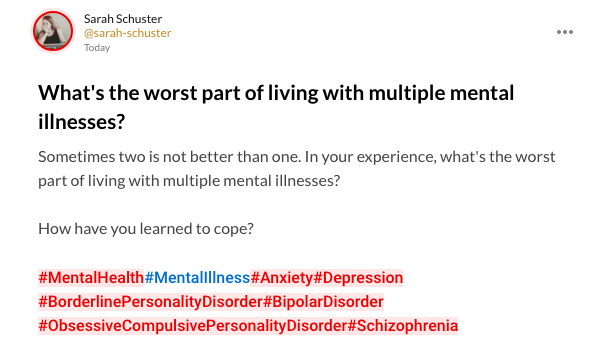For some, a mental illness diagnosis comes with answers and relief. Behaviors and thoughts you maybe couldn’t understand before can be explained, and (hopefully) you’re given some treatment options to help you find a little mental peace.
When you’re diagnosed with more than one mental illness though, the answers can become less clear. It can be hard to tell where one starts and the other begins — making taking care of your mental health a little messier. To explore this, we asked people in our mental health community who have been diagnosed with more than one mental illness to share one of the “worst” parts of their experience.
Having more than one mental illness doesn’t make you “more crazy.” It doesn’t make you “broken.” It doesn’t mean you’re untreatable. If you can relate to any of the answers below, please know you’re not alone.
Here’s what our community shared with us:
- “The fact that no one can actually see any of them but everyone seems to have an opinion of how you can ‘fix’ it. My illnesses are all invisible. They fail to realize one treatment doesn’t work for all of my mental illnesses. There are multiple things I need to do, but the constant war that’s in my head between depression and anxiety doesn’t make me want to do anything. I just want five minutes of silence and no one can ‘see’ why.” — Katelyn B.
- “Having to combat symptoms that push against each other constantly. Like if I’m experiencing symptoms from my generalized anxiety and depression at the same time, my depression won’t want to be productive and do anything but my anxiety makes me well aware that not doing anything will mess me up so I end up just sitting there with this uncomfortable wave of fear mixed with depression.” — Kira M.
- “Telling people. When I tell people I have depression and anxiety they kind of get it, then I tell them about my compensatory narcissism disorder (CND) and my PTSD, they just sort of stare at me as though I’m just listing letters. I once had someone ask if I was ‘collecting mental illnesses…’ Felt like I was being punched.” — Leigh H.
- “They are working against each other… making each other worse and worse. Plus it’s a lot of work to get treatment. Getting treatment for one illness while all other illnesses are waiting to strike harder. That is why feel untreatable, it’s too much to work on. I don’t know which symptom is from which illness. I don’t know of my feelings and behavior are ‘normal’ or not. It is a never-ending story. A never-ending battle.” — Mandy L.
- “I feel like I’m trapped between not wanting to continue to live like this and not wanting to die.” — Andrew S.
- “It seems like there are never any win-win situations. It’s also win-lose. You conquer one thing, the next thing plows you back over. It’s exhausting.” — Brianna H.
- “Constantly changing how I feel about myself, others and just stuff around me. One minute I’m upset and hate everything, then the next I’m anxious and scared about what will happen in the next few minutes. I can’t control my mood no matter how hard I try, and the littlest things can make me sob.” — Makenha C.
- “When the illnesses bounce off of one another it becomes hard to differentiate what I’m feeling. Depression causes me to want nothing to do with anything and when anxiety comes into play, I get worried about not doing anything and it is like a spiral downward to find the motivation to exist.” — Hailee J.
- “For me, it’s trying to figure out what’s the cause when I’m feeling unwell, and how to fix it, since my conditions and symptoms compound on each other. (Chronic pain, depression, anxiety — each make the other worse.) It’s also trying to juggle the depression and anxiety. Example: depression makes me tired all the time, so I try to get some more rest, and then resting so much makes me feel like I’m wasting time (anxiety). And don’t get me started on trying to find the right mix of medications!” — Cassandra E.
- “Not knowing if you’ll ever have peace of mind.” — Brittany L.
- “That one always feeds the other and vice versa, making each worse (if you have two) then what they’d be by themselves. I have depression and BPD.” — Greg M.
- “Living with anxiety and depression makes it hard to fight sometimes. You just don’t care about anything at all and sometimes you care about all the little things… It’s like fighting one monster but another one is winning. It’s a constant battle.” — Manju H.
- “Getting people to believe me. I’ve been told by a mental health provider that people with bipolar don’t have anxiety. I don’t have an anxiety disorder but I have PTSD which gives me anxiety.” — Aimee J.
- “No matter how hard I try, or how well I think I’m doing, the rug always gets pulled out from underneath me when I least expect it. I focus on not being overwhelmed by my anxiety and I end up seeming cold and moody to other people. If I focus on not letting myself think in black and white from my BPD, I end up having an anxiety attack. If I focus on thinking positive to combat the depression, I end up becoming annoyed when other people won’t forget my bad days and I go back to black and white thinking. People forget that not only am I fighting multiple mental illnesses, but they are busy fighting each other too.” — Ciara L.
- “Feeling alone. Family looking and treating you like you’re ‘crazy.’ They don’t check on you to make sure you are OK. Fighting the thoughts of dying, the fears that take over your mind then your heart. Feeling unworthy, forgotten, pointless and unsure of your own purpose.” — Leo G.
- “The worst part is still feeling like I have to hide it when anyone shows interest in me. The fear of being left over my disorders tends to leave me shut off from others now. Sometimes it’s just easier not having friends or a relationship.” — Catherine H.
- “Not being able to pinpoint the source of my fear/anxiety/depression. Say I’m going to a social gathering with food — is my heart pounding through my chest because my eating disorder is scared of eating in front of people? Is it my social anxiety worried I won’t fit in? Is it my depression telling me I’m not worthy of company and I should just stay home? It’s easier to solve a problem when you know the cause, but multiple things wrong in your brain make it that much more difficult.” — Elissa M.
- “That they feed on each other creating a circle. It is so exhausting that it takes all my energy just to do simple things like getting out of bed, showering, getting dressed or even eating.” — Laura S.
- “The way all three things team up to make life miserable. My depression kicks off because some difficult stuff is going on, and then my anxiety starts telling me that means I must be falling off the wagon and having another breakdown. OCD kicks into gear then, and says that the only appropriate course of action is to start Googling my symptoms obsessively ‘just in case,’ at which point depression points out what’s going on and makes me even more low. It’s like they’re freaking besties. The ‘Mean Girls’ of mental illness.” — Caro H.
- “Finding the right combination of meds when you only see your psychiatrist once a month. It’s like one step forward two steps back. You feel helpless like nothing will ever work and you’ll never feel better or be neutral.” — Cheyenne N.
- “The fact that they’re all separate, but they unite to form one mega-mental illness. I have five separate diagnoses, and they all have their own shit storm to deal with. Combining the five means I have a daily battle with something or other, and there’s never just a ‘normal’ day where I feel fine, or have energy, or am excited about life. It’s like an extreme balancing act where if one illness is fine, the others are playing up.” — Becca Mu.
- “Never getting a break. When one quiets down, another comes in to take its place. Managing them requires a constant level of awareness and mindfulness to ensure I’m functioning properly. There’s never a quiet moment in my head. Peace of mind is not something I will ever be able to relate to.” — Clara S.
What helps you cope multiple mental illnesses? Join the conversation below.
Read the responses, and reply yourself.
Photo by pawel szvmanski on Unsplash


